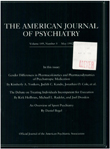Variability in the application of contemporary diagnostic criteria: endogenous depression as an example
Abstract
Specified diagnostic criteria have been credited, in part, with improving diagnostic reliability. The authors hypothesize that nonuniform application of these criteria across different research centers has been one factor responsible for the failure to replicate research findings. For example, researchers using a narrow interpretation of the Research Diagnostic Criteria (RDC) have found a highly significant association between endogenous depression and a positive dexamethasone suppression test result, whereas researchers using a broad interpretation have failed to find the predicted relationship. The authors used two interpretations of the RDC and DSM- III endogenous/melancholia criteria to diagnose 60 depressed patients and found significant difference in rates of diagnoses and symptoms.
Access content
To read the fulltext, please use one of the options below to sign in or purchase access.- Personal login
- Institutional Login
- Sign in via OpenAthens
- Register for access
-
Please login/register if you wish to pair your device and check access availability.
Not a subscriber?
PsychiatryOnline subscription options offer access to the DSM-5 library, books, journals, CME, and patient resources. This all-in-one virtual library provides psychiatrists and mental health professionals with key resources for diagnosis, treatment, research, and professional development.
Need more help? PsychiatryOnline Customer Service may be reached by emailing [email protected] or by calling 800-368-5777 (in the U.S.) or 703-907-7322 (outside the U.S.).



